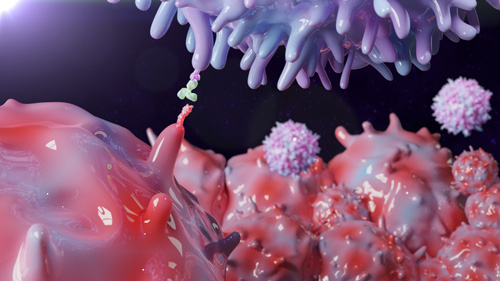
Popular topics

-
References
Eskander RN et al. (2023). Pembrolizumab plus chemotherapy in advanced endometrial cancer. N Engl J Med 388, 2,159-2,170.
Galienne M and Rodrigues M. (2021). [New drug approval: Dostarlimab - second line in advanced MSI endometrial cancer]. Bull Cancer 108, 675-676.
Han Y et al. (2020). PD-1/PD-L1 pathway: current researches in cancer. Am J Cancer Res 10, 727-742.
Jia L et al. (2018). PD-1/PD-L1 pathway blockade works as an effective and practical therapy for cancer immunotherapy. Cancer Biol Med 15, 116-123.
Mahdy H et al. (2023). Endometrial cancer. Available from: StatsPearls [Internet].
Mirza MR et al. (2023). Dostarlimab for primary advanced or recurrent endometrial cancer. N Engl J Med 388, 2,145-2,158.
Riva A and Chokshi S. (2018). Immune checkpoint receptors: homeostatic regulators of immunity. Hepatol Int 12, 223-236.
Shiravand Y et al. (2022). Immune checkpoint inhibitors in cancer therapy. Curr Oncol 29, 3,044-3,060.
Westin SN et al. (2024). Durvalumab plus carboplatin/paclitaxel followed by maintenance durvalumab with or without olaparib as first-line treatment for advanced endometrial cancer: the phase III DUO-E trial. J Clin Oncol 42, 283-299.
Monoclonal Antibodies for the Treatment of Endometrial Cancer

Endometrial cancer makes up over 90% of uterine cancer cases and is the most common gynecological malignancy in the US, with an estimated 60,000 new cases in 2023 and around 11,000 deaths (Mahdy et al. 2022).
Until recently, for patients with primary advanced or recurrent endometrial cancer, the standard first-line treatment was chemotherapy alone, typically using a combination of the drugs carboplatin and paclitaxel. Unfortunately, the long-term prognosis of this treatment is poor, with a median overall survival (OS) of less than three years (Mirza et al. 2023).
However, researchers have recently been investigating the integration of immunotherapy drugs, known as immune checkpoint inhibitors (ICIs), into this treatment combination to increase its efficacy. In this blog, we discuss the recent approval of dostarlimab (Jemperli), a PD-1 inhibitor, in combination with chemotherapy as a first-line treatment for endometrial cancer.
Keeping the Immune System in Check
In recent years, the idea of manipulating parts of the immune system to fight against diseases like cancer has become somewhat of a hot topic. In particular, ICIs have shown a lot of promising results in the treatment of multiple cancer types. To understand how these drugs work, let’s first discuss the pathways that they block, the immune checkpoint pathways.
The immune system is constantly trying to strike the right balance of reaction in response to a trigger. Underreaction can enable a harmful pathogen to outrun the immune response and wreak havoc on the body. However, overreaction can lead to a detrimental response targeted toward nonharmful stimuli, as is the case with autoimmune diseases, or an over-the-top response to a pathogen leading to the destruction of host tissues. Hence, the immune system constantly employs methods of self-limitation to protect against excessive damage.
This is where immune checkpoint pathways come into play. Receptors of these pathways are often expressed or upregulated on immune cells upon their activation and, once stimulated by their ligand, act as a way to pump the brakes, inhibiting functions such as cytokine production and costimulation (Riva and Chokshi 2018).
The Great Escape
Unfortunately for us, cancer cells are crafty and have evolved ways to commandeer these pathways, thus softening the blows of the immune system and dodging elimination. It’s no surprise, then, that many studies have focused on targeting immune checkpoint pathways for cancer therapy.
The programmed cell death protein 1 (PD-1)/programmed death ligand 1 (PD-L1) pathway has gained particular interest. This is due to the revelation that many cancer cells express PD-L1 in tumors to curtail the response of tumor-infiltrating T cells, one of the main soldiers of anticancer immunity, via binding to PD-1 on their surface (Han et al. 2020).
PD-1 inhibitors, such as nivolumab, pembrolizumab, and cemiplimab, and PD-L1 inhibitors, like durvalumab and atezolizumab, have been approved for the treatment of various cancer types, including lung cancer, melanoma, and breast cancer (Shiravand et al. 2022, Jia et al. 2018).
Another PD-1 inhibitor known as dostarlimab was approved for second-line monotherapy treatment in 2021 for patients with advanced or recurrent endometrial cancer who did not respond to chemotherapy. The treatment showed promise for a specific class of the disease, patients with mismatch repair-deficient (dMMR) microsatellite instability-high (MSI-H) tumors, in which the DNA mismatch repair system cannot correct errors in DNA replication to prevent mutations (Galienne and Rodrigues 2021).
This subtype accounts for around 30% of endometrial cancers and is associated with increased expression of PD-1 and its ligands, making these tumors a hopeful target for anti-PD-1 therapy. In fact, dostarlimab as a second-line treatment in dMMR-MSI-H patients conferred a 61.4% probability of progression-free survival (PFS) at 24 months (Mirza et al. 2023). Due to the success of dostarlimab in endometrial cancer, researchers have turned their attention to testing the efficacy of this drug as a first-line treatment in combination with chemotherapy.
Ruby Results
A recent double blind, phase three clinical trial, known as RUBY, randomly assigned patients with advanced or recurrent endometrial cancer to receive either dostarlimab or placebo in combination with chemotherapy every three weeks for six cycles, followed by a maintenance therapy of dostarlimab or placebo administered every six weeks for up to three years. Treatment success was analyzed based on PFS and OS of the patients.
Overall, patients who received chemotherapy and dostarlimab had a better prognosis than those who received chemotherapy and placebo, with a PFS at 24 months of 36.1% and an OS at 24 months of 71.3% in the dostarlimab group compared to 18.1% and 56%, respectively, in the placebo cohort.
Strikingly, when stratified based on disease subtype, patients with dMMR-MSI-H tumors tended to fare even better, with a PFS at 24 months of 61.4% when administered with dostarlimab compared to 15.7% when given placebo, and an OS of 83.3% compared to 58.7%. The dostarlimab treatment regime in dMMR-MSI-H patients had a 72% lower risk of progression or death when compared to the placebo treatment (Mirza et al. 2023).
Thanks to these promising results, in the summer of 2023 dostarlimab was approved by the Food and Drug Administration (FDA) as a first-line treatment for patients with advanced or recurrent dMMR-MSI-H endometrial cancer. This was swiftly followed by approval in the UK and EU later that year.
Game, Set, Match
While dostarlimab is the first immunotherapy combination to demonstrate a survival benefit in endometrial cancer, competition may not be that far behind. The PD-1 inhibitor pembrolizumab (Keytruda) and the PD-L1 inhibitor durvalumab (Imfinzi) have both shown clinically significant benefits in PFS when used as a first-line treatment in combination with chemotherapy in patients with advanced endometrial cancer (Eskander et al. 2023, Westin et al. 2024).
Given the few treatment options previously available for those who suffer from endometrial cancer, the recent progression in immunotherapy drugs has given new hope for patients and ongoing research will focus on expanding viable therapeutic options and building on combination drug regimes to improve their efficacy.
Interested in Studying Immune Checkpoint Inhibitors?
Bio-Rad offers a range of anti-idiotypic antibodies, including antibodies against PD-1 or PD-L1 inhibitors, for the development of highly selective and sensitive pharmacokinetic (PK) and anti-drug antibody (ADA) assays.
References
Eskander RN et al. (2023). Pembrolizumab plus chemotherapy in advanced endometrial cancer. N Engl J Med 388, 2,159-2,170.
Galienne M and Rodrigues M. (2021). [New drug approval: Dostarlimab - second line in advanced MSI endometrial cancer]. Bull Cancer 108, 675-676.
Han Y et al. (2020). PD-1/PD-L1 pathway: current researches in cancer. Am J Cancer Res 10, 727-742.
Jia L et al. (2018). PD-1/PD-L1 pathway blockade works as an effective and practical therapy for cancer immunotherapy. Cancer Biol Med 15, 116-123.
Mahdy H et al. (2023). Endometrial cancer. Available from: StatsPearls [Internet].
Mirza MR et al. (2023). Dostarlimab for primary advanced or recurrent endometrial cancer. N Engl J Med 388, 2,145-2,158.
Riva A and Chokshi S. (2018). Immune checkpoint receptors: homeostatic regulators of immunity. Hepatol Int 12, 223-236.
Shiravand Y et al. (2022). Immune checkpoint inhibitors in cancer therapy. Curr Oncol 29, 3,044-3,060.
Westin SN et al. (2024). Durvalumab plus carboplatin/paclitaxel followed by maintenance durvalumab with or without olaparib as first-line treatment for advanced endometrial cancer: the phase III DUO-E trial. J Clin Oncol 42, 283-299.
You may also be interested in...

View more Bioanalytical or Cancer blogs















